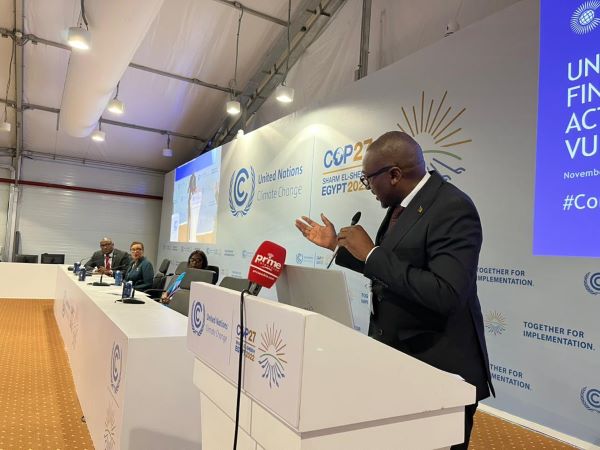Climate change, evidenced by the food crisis haunting Somalia and Kenya, among other countries on the African continent, is a clarion call for small scale farmers to innovate and devise adaptation solutions to stem the tide of growing hunger, key anti-crisis campaigners have warned.
In a statement prior to addressing a sideline meeting at the ongoing COP 27 in Egypt, Sabrina Dhowre Elba, UN Goodwill Ambassador, Dina Saleh, IFAD Regional Director, and Dan Collison, Chief Executive, Farm Africa call for urgent need by small scale farmers to plan and strategize anti-climate change solutions.
The strategy will help avert a repeat of the hunger crisis that has afflicted some north and east African countries with a call for urgent disbursement of the climate financing.
The key campaigners note the urgency of small scale farmers to seek preparedness to counter a recurrence of the food crisis in Somalia and Kenya which has affected thousands of inhabitants and cannot be stopped without supporting the rural communities.
In another development, Zambia’s minister of Green Economy and the Environment Collins Njovu calls for co-existence among players to enhance speedy adaptation actions and support, a vital cog for minimising and addressing loss and damage associated with the adverse impacts of climate change.
In welcoming the Glasgow–Sharm el-Sheikh mooted work programme on the global goal on adaptation, underscoring the importance of guiding, minister Nzovu appealed to the developed countries in Annex (ii) to the convention to scale-up the support for developing countries.
This will enhance the adaptation to climate change, enhance their resilience and come forward with a detailed and explicit roadmap on how the commitment made at last year’s Conference for Parties (COP26) to at least double climate finance for adaptation to developing countries from 2019 levels by 2025 will be realised, as soon as possible.
Minister Nzovu addressing a joint commonwealth side event dubbed: “unlocking the private sector to accelerate climate action in small and vulnerable countries”, cites the COVID 19 that ravaged the continent, dwindling economic growth.
He urged leaders to use COP 27 as a showcase of Africa’s abilities to ‘rise from the ashes’ and make a turning point for all parties to translate existing goals and pledges into concrete actions and work together to address the challenge of global climate change.
The effects of the pandemic on economies resulted in borders shutting down, affecting intra-trade as espoused under the regional integration concept, a cause for drawing lessons and compelling the continent and all players to work together for a lasting and durable solution.
“If we have learnt one thing from recent events, in particular from the covid-19 pandemic, it is the need to work together”.” He said.
Collaborative effort has no substitute therefore we have to unite even more to attain greater heights. Minister Nzovu notes that behind the current events, there are three huge crises that are constantly lingering at the back of all players being; climate change, biodiversity loss and land degradation.
Minister Nzovu warned against countries or any continent working in ‘silos’ your excellencies, and thought had the capability of tackling the issues single handed and that challenges are common and interconnected across the globe ultimately requiring collective action to be resolved for the betterment of everyone.
There is greater need for fundamental shifts in climate financing as we turn global pledges into practical collective climate actions.
The collective actions for climate adaptation demand enormous resources that cannot be provided by the public sector alone. It is therefore important that private sector investment is mobilised to close the gap for adaptation financing (UNEP, 2018).
Mobilising private sector financing is essential but public financing and policies need to provide the foundation for the private sector to embrace climate actions. African governments, Zambia included, should make resolute efforts to work with and strengthen private sector involvement in the implementation of the NDCS.
Minister Nzovu calls for development of mechanisms and strategies to unlock private sector finances. When and if achieved, there should be facilitation for investment and implementation of national and local adaptation priorities.
The choice to emphasise the place of private sector involvement in climate finance at this cop is very timely hence the need to create space for devising measures that encourage adaptation as a survival measure.
“We need to urgently build a business case (s) that is more skewed towards adaptation for our own survival as a human race.”








